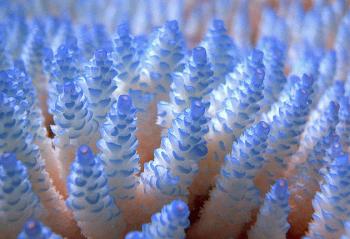UXBRIDGE, Canada – An apparent rapid upswing in ocean acidity in recent years is wiping out coastal species like mussels, a new study has found.

Coral at the Great Barrier Reef. Rising carbon dioxide levels in the world’s oceans due to climate change, combined with rising sea temperatures, could accelerate coral bleaching, destroying some reefs before 2050, said an Australian study in January 2002. (Reuters)
“We’re seeing dramatic changes,” said Timothy Wootton of the Department of Ecology and Evolution at the University of Chicago, lead author of the study published Monday in the Proceedings of the National Academy of Sciences. The study shows increases in ocean acidity that are more than 10 times faster than any prediction.
“It appears that we’ve crossed a threshold where the ocean can no longer buffer the effects of CO2 in the atmosphere,” Wootton told IPS.
